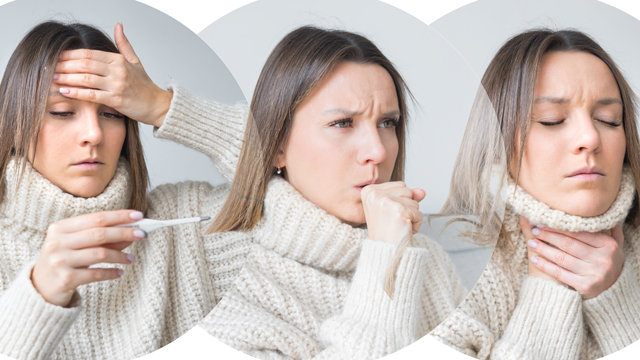Allergy season is upon us, and so is the transition time from the typical cold and flu season. Unfortunately, COVID-19 remains a public health crisis that we continue to battle more than a year after its original onset here in the United States. There are many overlapping symptoms from these three types of disease processes, so how can we differentiate?
 First, it is best to discuss some similarities. Although the virus that causes the disease is widespread, the majority of symptomatic COVID-19 infections tend to be on the milder side. Some common symptoms that COVID-19 shares with colds and allergies are nasal congestion, runny nose, sore throat, and cough. The most common symptom that people with allergies complain about is nasal congestion. The common cold and allergies also may involve more sneezing at times, as well as post-nasal drainage.
First, it is best to discuss some similarities. Although the virus that causes the disease is widespread, the majority of symptomatic COVID-19 infections tend to be on the milder side. Some common symptoms that COVID-19 shares with colds and allergies are nasal congestion, runny nose, sore throat, and cough. The most common symptom that people with allergies complain about is nasal congestion. The common cold and allergies also may involve more sneezing at times, as well as post-nasal drainage.
Get to Know Your Symptoms
Since the common cold and COVID-19 are both viral infections, people generally will feel more ill than when they are suffering with allergies. Fever is the most common symptom present in individuals with COVID-19. Although some people who have COVID-19 may present with colds, it is less likely. Shortness of breath is much more common with COVID-19 than colds. However, individuals with a history of respiratory illnesses such as asthma may also experience this with a cold.
One of the most talked about symptoms of COVID-19 is the loss of smell and taste that can occur with infection. About 85 percent of patients with COVID-19 experience some sort of subjective disturbance in their sense of smell. Fortunately, this is usually short-lived, and only 15 to 20 percent of patients will experience this for more than sixty days. After six months, this goes down to 5 percent. This is usually one of the early symptoms of COVID-19, so if experienced, quarantine and testing for confirmation of infection are highly recommended. Although it is possible to lose your sense of smell with other viral infections of the nasal passages, it is much less common. Note: If you do lose your sense of smell, remember to check your smoke alarms and check dates of food for spoilage prior to eating and drinking them.
Allergies Are More Predictable
Richmond continually ranks as one of the worst cities in the United States for allergy sufferers annually. Spring is the most common season for people to experience symptoms. It is evident in April just by looking outside at pollen-dusted cars and patio furniture and seeing the volume of pollen circulating in the air at this time. There are certain symptoms that are much more common with allergies than viral infections. Allergies may cause more itchy, watery eyes and nose, sneezing, and perhaps even skin rashes such as hives. If seasonal allergies are related to pollen, reactions are typically worse when pollen counts are high or when outdoors. Allergies tend to be more intermittent due to exposure, rather than consistent. And although allergy sufferers manage conditions such as headaches and sinus pressure, overall, people feel less ill than they do with viral infections. Also, fever is rarely present with allergies.
It is extremely important to distinguish what symptoms you have in trying to determine if what you have is in fact allergies, cold, or COVID-19. Generally speaking, allergies are consistent from year to year, so if you have had them before, you probably will have them again. However, people can develop seasonal allergies at any point of their lives. Allergy-type symptoms are more likely to be alleviated by over-the-counter medications such as antihistamines and steroid nasal sprays. Again, you are less likely to feel genuinely sick with allergies compared to any viral infection, like COVID-19 or the common cold.
If You’re Concerned, Get Tested for COVID-19
If you do feel ill, it may be difficult to distinguish a typical cold from COVID-19 infection. An important factor to consider is your exposure to others who have been infected with COVID-19 that would increase your risk of contracting the virus. If you lose your smell or taste, this is a red flag for COVID-19, so you should presume you are positive until proven otherwise. Of course, if shortness of breath and cough become a problem, COVID-19 may be more likely as well. It is important to follow CDC guidelines if you are exposed to someone with COVID, even if
you are asymptomatic.
If there is any concern that you may be infected, it is important to contact your doctor and obtain advice on testing. There are several urgent care centers and pharmacies in town that offer testing, as well. As the pandemic continues, it’s important to remember that if you develop some of these symptoms, you should take extra precautions. It is better to be safe, rather than risk infecting others, including family and friends.




